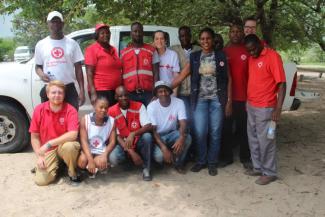weltwärts volunteers
“Many fellow Namibians think we are a foreign organisation”
 NRCS
NRCS
Who is your target group?
The Red Cross works with all the needy and vulnerable people in Namibia. Only some of our projects have selected target groups such as the youth or orphans and vulnerable children. Other target groups I can specify are HIV positive people who we actively support through our own home-based care programme, or marginalised ethnic communities such as the Himbas in Kunene and the San in Tsumkwe and Ohangwena.
How do you improve the situation of HIV positive people?
We have been working very closely with other national Red Cross societies, the UN, the EU and of course our own government to ensure that they receive appropriate support, including health care, psycho-social counselling as well as material support such as food, clothing and blankets. We have built strong and well established home-based care structures. We monitor some of the patients to make sure that their anti-retroviral therapy is successful. This support improved the life situation of many people. A lot of our project participants who were bed-ridden actually became mobile again and can enjoy their life once more.
What was your biggest success so far?
If I had to pick a project of ours that was a great success I would definitely go for the water and sanitation project we implemented in the Kunene Region. We rehabilitated and protected water sources and drilled boreholes for the Himba communities. Most of the Himba area is mountainous and rocky, and the NRCS was among the very few organisations that managed to implement developmental projects in that challenging environment. Today, many Himba communities have access to safe drinking water from water pumps and taps. The incidence of water-borne diseases has been minimised. In the past, people and animals used the same water sources, and that increased the risk of drinking contaminated water. More generally speaking, I am proud of various capacity-building activities, including training in modern agricultural practices in response to climate change, that we run in remote and disadvantaged areas. It is important to build resilience through information on disease prevention, healthy lifestyles and strengthening food security.
And what was the biggest setback?
Well, since the World Bank has declared Namibia to be an upper-middle-income country, a lot of humanitarian assistance from foreign organisations and governments has been withdrawn from our country. Namibia is supposed to be able to address all its developmental and humanitarian needs on its own. Unfortunately, this rating does not reflect the reality at all.
How is your work funded?
The NRCS receives a subsidy from the Namibian government; it also has partner national societies that support the implementation of some projects. The Spanish or the Japanese Red Cross are examples. International support once accounted for 90 % of annual NRCS funding, but unfortunately the share has dropped to less than half. As a result, we had to shut down projects and can now provide less support to the beneficiaries.
What are your expectations for the future?
The future will only be bright for the Namibia Red Cross if we forge more local partnerships, especially with the Namibian government and the domestic corporate sector. In the absence of international support, local supporters are becoming more important. We have to improve fundraising in Namibia. Moreover, we need to convince the government to subsidise activities as well as to outsource programmes of a humanitarian nature to us, for instance in regard to water and sanitation in rural areas. Disaster management and first aid should also be exclusive working fields reserved for the RC since we are experts. Finally, we must become better known in Namibia. Too many people still do not know about us. Most fellow Namibians still think the Red Cross as a rich and most of all foreign organisation. They hardly understand that we are a humanitarian agency established through Namibian law and our country´s signing of the Geneva Conventions.
When was the NRCS founded?
It was established by an act of parliament in 1991. It is a national humanitarian agency with an auxiliary role to public authorities and started operations in February 1992. It was admitted as a member of the International Federation of the Red Cross and Red Crescent Societies (IFRC) in 1993. Before Namibia’s independence in March 1990, the Red Cross existed in the country only as a branch of the South African RC.
Rosemary Nalisa is the NRCS manager in charge of humanitarian diplomacy.
https://twitter.com/rosenalisa
Brian Patjens is a weltwärts volunteer seconded to the NRCS by the German Red Cross.
brian.patjens@googlemail.com